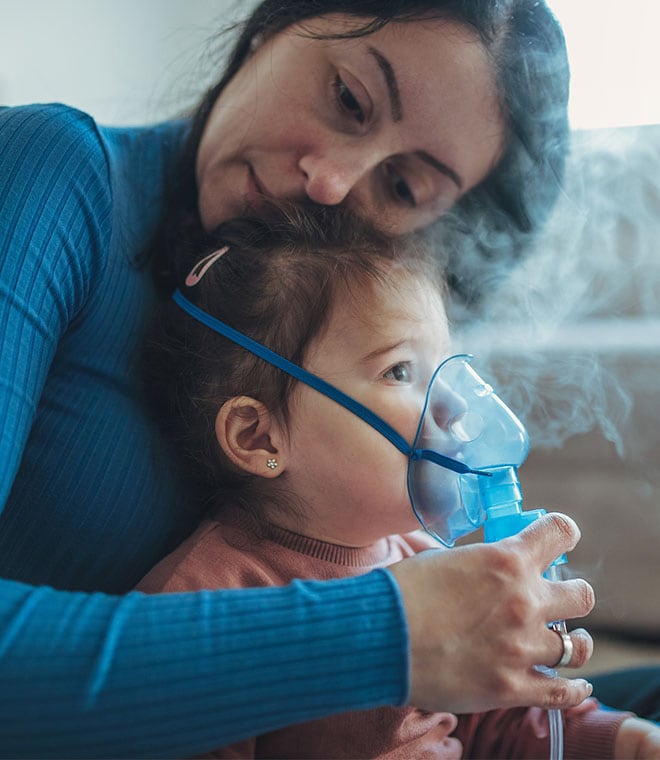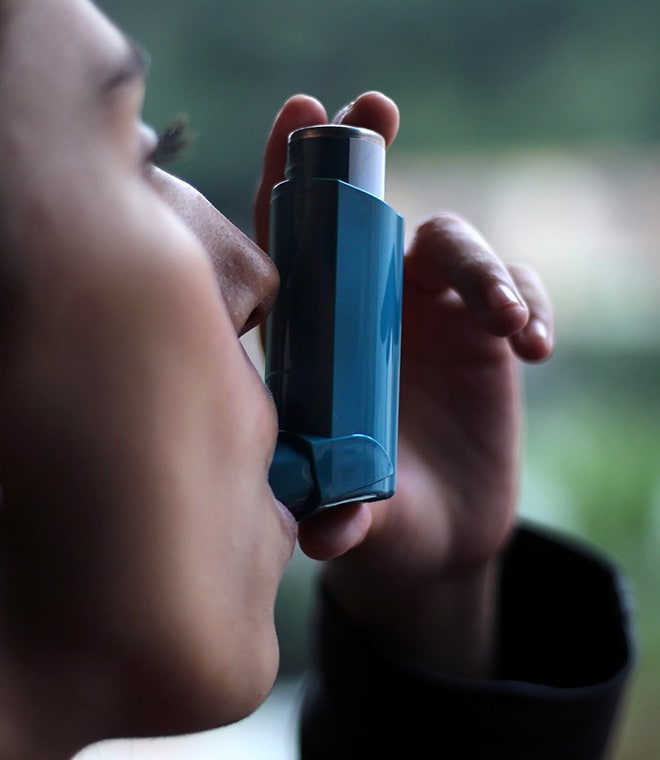Health
Asthma attacks: Causes, symptoms and treatment
By Sanjay “Jay” Patel, DO | Allergy & Immunology Jul 07, 2023 • 6 min
If you’re one of the millions of people who suffer from asthma, taking steps to control asthma attacks and knowing how to respond to them is vital to your well-being.
What are asthma attacks?
Asthma attacks are severe, sudden or gradual asthma flare-ups. They happen when the airways in the lungs swell up and/or constrict, reducing the space that air has to travel in and out of the body. The change in the airways may come on rapidly, and it can make it difficult to breathe. You may experience wheezing, chest tightness, chest pressure and/or a cough from asthma attacks.
Some people who have asthma experience ongoing symptoms that may improve and worsen at different times. Others have symptoms that last for a short time, stop and then return again in the future.
What are asthma triggers?
Conditions in the environment around you combined with your daily activities can have an impact on your symptoms. Certain factors may cause you to have an asthma attack, and healthcare providers refer to these as asthma triggers. Asthma is a chronic condition, meaning it persists over time. Even if you haven’t had an asthma attack in a long time, you are still considered to have asthmatic lungs.
What triggers asthma?
Each person with asthma has different triggers. Identifying your triggers can help you take steps to avoid or reduce exposure to whatever it is that causes an asthma attack. Some common triggers of asthma include:
- Additives and sulfites found in shrimp, wine, beer, dried fruits and other foods and beverages
- Air pollution
- Cockroaches and dust mites
- Cold air
- Exercise or strenuous physical activity, such as carrying a heavy object
- Gastroesophageal reflux disease (GERD)
- Medications, such as beta blockers for high blood pressure and non-steroidal anti-inflammatory pain relievers (NSAIDs), such as ibuprofen and naproxen
- Mold
- Particles from substances, such as sawdust and baking flour
- Pet dander, saliva and urine
- Respiratory infections, such as colds and the flu
- Stress and strong emotions, such as anxiety attacks and heavy laughter
- Strong odors, such as fragrance found in chemical cleaning products and perfumes
- Tobacco and marijuana smoke
What does asthma feel like?
People describe asthma in different ways. You might feel like you can’t catch your breath or breathe in all the way. During an asthma attack, you may feel pressure, pain or tightness through your chest due to the inflammation in your lungs. You may hear a whistling sound called wheezing or a dry cough. Kids with asthma may not be able to describe their symptoms, but you may notice episodes of dry coughing, wheezing and/or heavy breathing (retractions of the chest).
How is an asthma attack different from regular asthma symptoms?
Everyday symptoms of asthma and the symptoms you experience during an asthma attack may be similar. However, the timing and severity differ. An asthma attack may come on gradually, or it may start suddenly. Asthma attacks cause severe symptoms.
What should I do during an asthma attack?
If you have asthma and are prone to attacks, your healthcare provider will likely prescribe a rescue inhaler. This device delivers medication to your airways to quickly reduce inflammation and help you breathe better.
When you experience an asthma attack, a rescue inhaler is often recommended. Then, if you know what triggered your symptoms, remove yourself from the cause if possible. For example, if you’re indoors and someone lights a cigarette, it’s best to step outside for fresh air.
If your rescue inhaler doesn’t work or you don’t have one available, or if your symptoms worsen rapidly, seek emergency medical treatment for an asthma attack.
Can you die from an asthma attack?
When not treated, severe asthma attacks can be deadly. An average of 10 people die from asthma every day in the U.S. However, most of these deaths can be prevented with proper treatment.
Treatments can reduce asthma attacks
The good news is that a combination of medical treatments and self-care strategies can control asthma and lower your likelihood of experiencing serious attacks. Your healthcare provider can help you identify your triggers, prescribe preventive medications, and give you tips on how you can modify your home and your activities to reduce the frequency and severity of asthma attacks.
Updated July 2023.
Sources:
- https://aafa.org/asthma/asthma-triggers-causes/allergic-asthma/
- https://mayoclinic.org/diseases-conditions/asthma/in-depth/allergies-and-asthma/art-20047458
- https://my.clevelandclinic.org/health/diseases/21461-allergic-asthma
- https://my.clevelandclinic.org/health/diseases/6424-asthma
- https://www.mayoclinic.org/diseases-conditions/asthma/symptoms-causes/syc-20369653
- https://medlineplus.gov/asthma.html
- https://aafa.org/asthma/asthma-facts/
- https://www.nhlbi.nih.gov/health/asthma/symptoms
- https://www.epa.gov/asthma/what-asthma-symptom-episode-or-attack
- https://www.nhlbi.nih.gov/health/asthma
- https://www.cdc.gov/nceh/features/asthmaawareness/index.html



